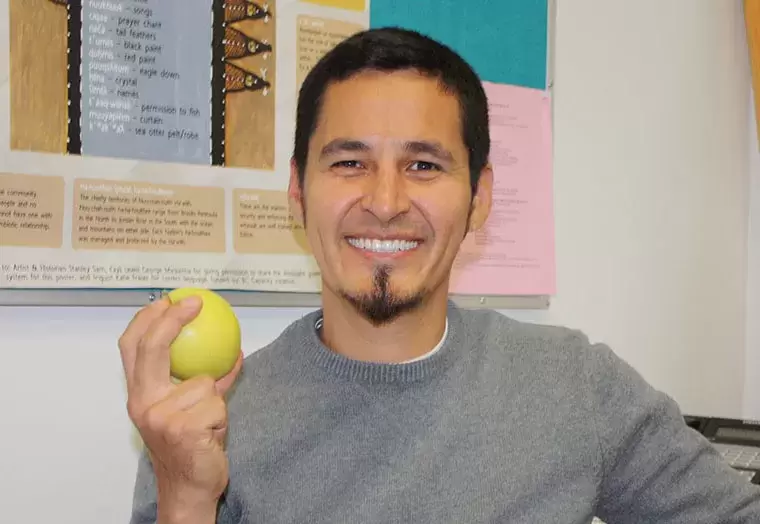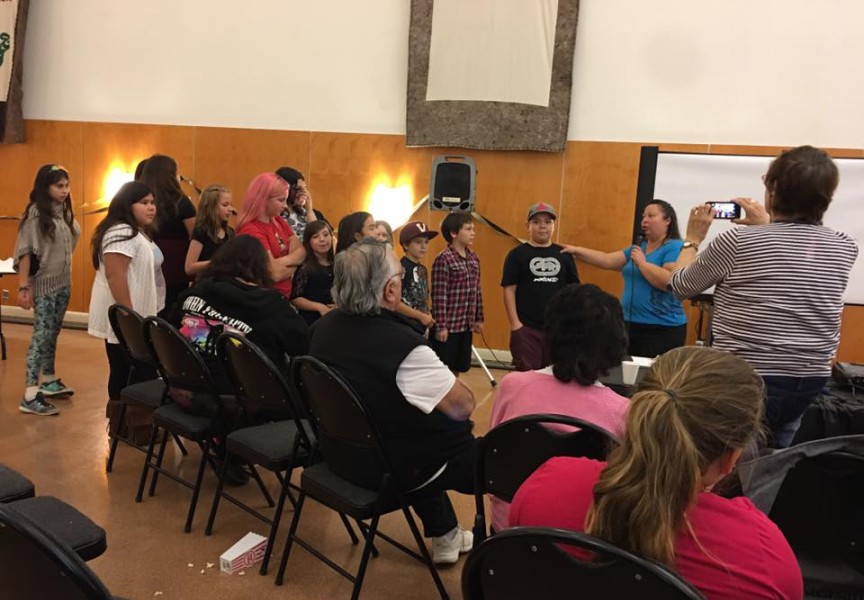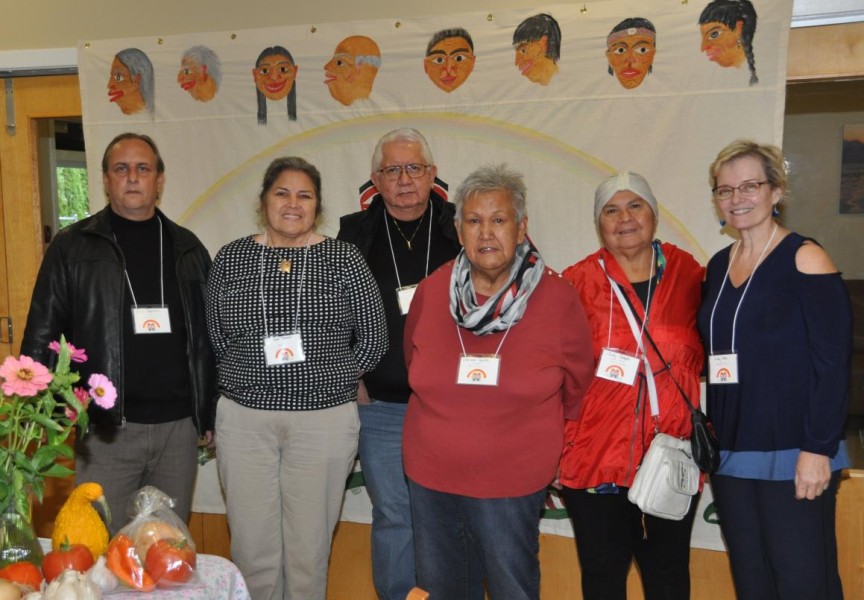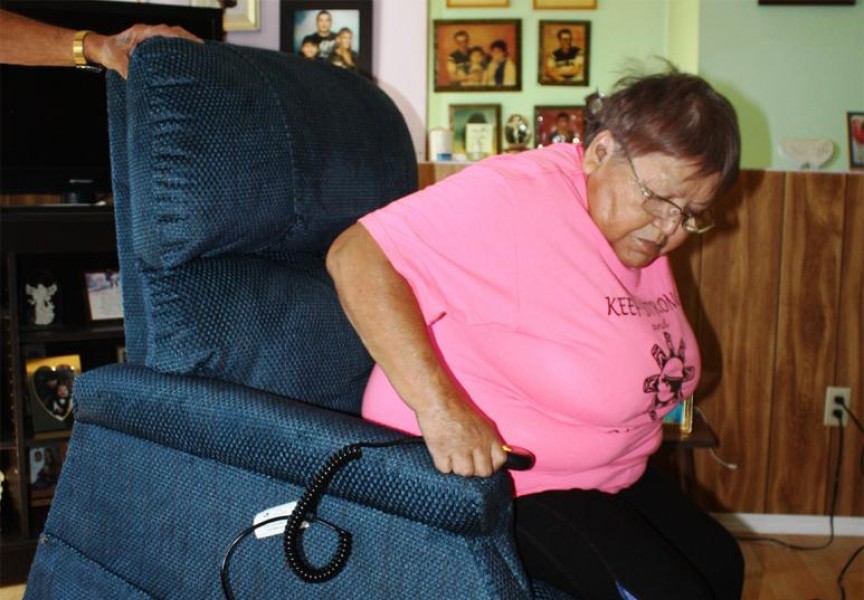Jason Sam is in his second year as the Nuu-chah-nulth Education Worker for Ucluelet Elementary and Secondary schools and brings to his job a positive and dynamic approach to supporting the children – and they are responding well to his approach.
“My purpose is to work with at-risk kids to improve their chances of success,” Sam said. “They inspire me; they work so hard and they deserve a fair shot. They’re more than willing to do that extra time to catch up,” he added.
The key to academic success for school children is proper nutrition, and Sam says he spends a lot of time seeking support to buy food to help the children through their day.
Sam arrives at the school well before eight in the morning to prepare a nutritious breakfast for the kids. He may whip up a batch of fruit smoothies or have cold cereal and fresh fruit to start their days.
“This is what keeps them fueled and coming to class,” said the young father of three.
The daily Breakfast Club has grown in popularity. When he launched the Breakfast Club there were about eight kids coming in early for breakfast and now there’s about 20 kids.
“The kids are great, they follow the rules and we never have any issues.”
Jason Sam is from Ahousaht but grew up in Port Alberni. He says he spent a lot of time with Tseshaht and Ditidaht people during his time in Port Alberni. After graduating from Alberni District Secondary School, Sam went on to Vancouver Island University to take a new program called Green Building and Renewable Energy. It was an engineering program that gave him the ability to design and install solar energy systems.
He is popular with the children, as evidenced by how they greet him in the hallways and randomly drop by his office for a visit.
He often stands in the hallways before class, reminding kids as they pass by that there’s Homework Club after school and he hopes to see them there. Sam calls his Homework Club his shining star achievement at the school.
“At first we’d get from six to 12 kids… now there’s 20 at times and they like coming to Homework Club,” said Sam.
The School District gave the club a nutrition grant, which Sam uses to buy pizza for the students to have before they begin work.
Sometimes an education assistant comes in or a teacher and we help them with math or science, Sam added.
The class runs from after school to 5:30 p.m. when the last school bus leaves for Tofino.
We’re underfunded and have to apply for grants and we do some fundraising, Sam said. Sometimes they will do pancake breakfasts by donation and they’ve been fortunate to receive support from community businesses like the Coastal Credit Union and from parent volunteers.
Sam turned fundraising into an education opportunity for the kids, teaching them how to write their own proposals for grants. With help from adults the students have successfully applied for more than $2,000 in grants, which goes toward nutrition and cultural programs.
He supports and encourages reading because, Sam say, it’s important to their success in school. And so, when students visit his office he sometimes plays some reading games with them.
The NEW worker is dedicated to his students, spending long hours supporting their education and teaching them important skills. When he’s not with the students, he’s sorting through teachers’ progress reports on the students or writing more proposals, or calling businesses and volunteers.
A major concern for Sam is the students who are bused in from Opitsaht and Esowista. Sam’s workday is typically from 8 a.m. to 5:30 p.m., but the children traveling by bus sometimes have 11-and-a-half hour days.
“So many kids have part-time jobs; they work to help contribute to the family,” said Sam. He said he has some Grade 9 students who work after school until 9 or 10 o’clock.
On the day that Ha-Shilth-Sa visited with Sam, he spent time making phone calls in an effort to look for solutions for his overtired students.
Sam admits that he hasn’t enough time to focus on First Nations culture, but when he can, he will bring elders in to help him get the kids interested.
“We might walk the trails and learn about traditional foods or we bring Maureen Touchie-Louie in to teach Nuu-chah-nulth language,” he said. The kids, said Sam, really want this kind of learning and they ask for the elders.
There is a Nuu-chah-nulth Native Studies class for Grades 8 and 9 students that Sam assists with. Sam says students are given the choice of Native Studies or French Language. This year he has 13 students in the Native Studies Class; 12 of the 13 students are of First Nations descent.
It is through the Native Studies program that guest educators are brought in, like elders and linguists. According to Sam, the program is one part Nuu-chah-nulth language, one part history and one part field trips.
Ucluelet Elementary and Secondary Schools received $25,000 in grants and school district support for a Sustainable Living program for students’ grades four and up. One of his goals is to bring some of his students to Ahousaht to meet Maaqtusiis School students and to do things like visit the Walk the Wildside Trail.
The school basketball team is just starting up for the season and Sam rounded up the boys for a lunch-hour meeting. That weekend, a celebrity coach was scheduled to visit the school and arrangements needed to be made to get kids to Ucluelet from Tofino.
Not only does the basketball team work on fitness and skill, but work is also being done to develop respect, team work and positive attitudes.
“The team does community service; they shoveled the mulch in the school garden,” Sam said.
“Kids don’t know where their food comes from,” said Sam. So with tremendous support from teachers, parents and the community, Ucluelet Elementary and Secondary School have developed an ambitious garden project designed primarily to teach kids to grow their own food. The garden is called their Outdoor Education Centre.
Behind Ucluelet Elementary School is a tall, chain-link fence enclosure that contains a green house, garden boxes and gardening equipment. The chain-link fence was required because Ucluelet has a large deer population and they cleaned out the garden the year before.
The children, along with the community, not only plant seeds and tend to the garden, but it is also used as a teaching tool to support the regular curriculum. The day Ha-Shilth-Sa visited the school children from the primary grades brought in worksheets. They visited different sections of the garden answering questions about plants. The exercise developed their writing and spelling skills and also taught them some science.
This year the children planted Brussels sprouts, tomatoes, herbs and lettuce. Fruit trees and berry bushes have also been planted. Several of the plants have been named by the kids, sometimes after a cartoon character, or just funny names; one tree is named after the principal.
Sometimes they take the food home and sometimes it’s donated to the local food bank.
“It was the kids’ idea to grow food to give to the community,” said Sam.
Sam is happy with his job and his wife and family are loving Ucluelet. His long-term goal is to see his students succeed.
“I would be happy to see one of these kids grow up and take over my job,” he said.







